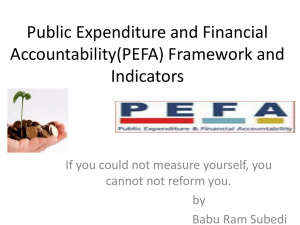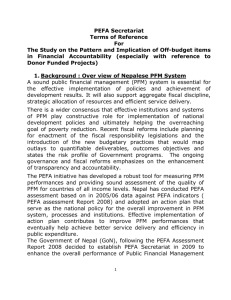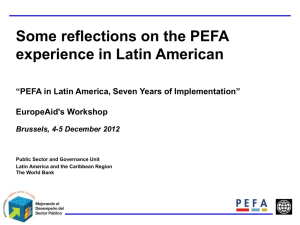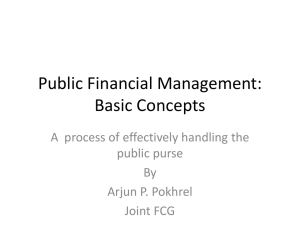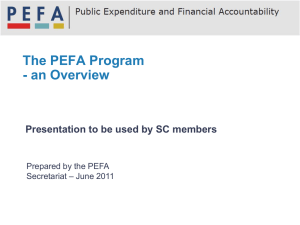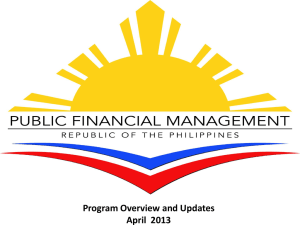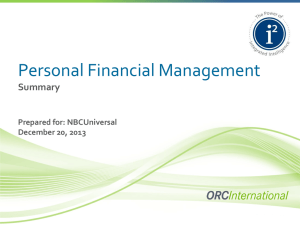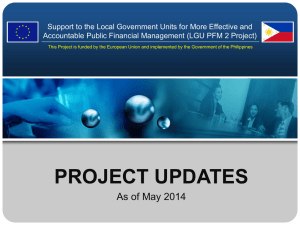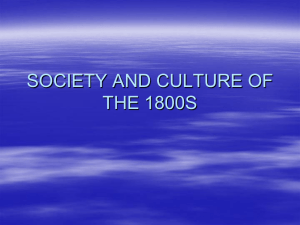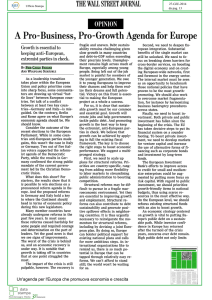world_bank_pefa_in_la_dec_4_2012
advertisement
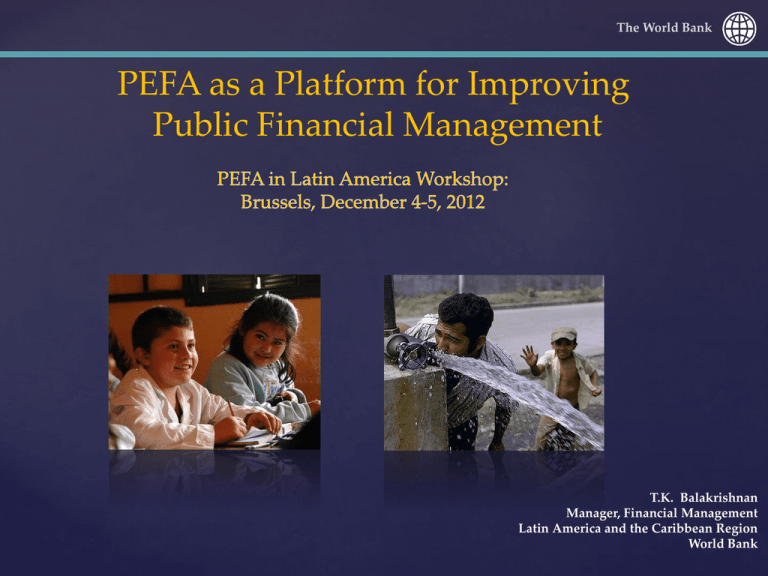
The World Bank PEFA as a Platform for Improving Public Financial Management T.K. Balakrishnan Manager, Financial Management Latin America and the Caribbean Region World Bank Topics 1. PEFAs’ Contributions to Public Financial Management (PFM) Reforms 2. Progress on PFM in the Latin America and Caribbean (LAC) Region 3. Linkages of PEFAs to Fiduciary Assessments on World Bank-financed Operations 4. Concluding Thoughts 1. PEFAs’ Contributions to PFM Reforms 2. Progress on PFM in the Latin America and Caribbean (LAC) region 3. Linkages of PEFAs to fiduciary assessments on World Bank-financed operations 4. Concluding Thoughts PEFA Assessments: A valuable platform PEFA analyses provide: • Valuable information on the strengths of the country’s PFM system and areas for improvements • A good basis for identifying priorities and capacity building programs • A platform for joint work and a common approach among development partners • Context for subnational or sectoral PFM reviews From PEFA to PFM Reforms HAITI: MOF OECS COUNTRIES: Strategic planning, budget execution controls, public procurement, accounting and financial reporting. Mexico developing PFM strategy and action plan. Jamaica COLOMBIA: Improvement of Haiti Guatemala HONDURAS: Initiatives following 2008 PEFA (examples: elimination of extra-budgetary funds, linkage of taxpayers registry with SIAFI, Informes de Rendicion de Cuentas, Legislative Budget Commission). 10 indicators improved in 2012 PEFA. cash/debt management strategies Treasury Single Belize Honduras Nicaragua El Salvador Costa Rica Panama Dominican Republic Trinidad & (implementation of Tobago Account). Venezuela Guyana Suriname Colombia Ecuador Peru Brazil PERU: Multi-year budget framework, results-based budgeting approach, modernization of SIAFI, placing PFM on the growth and development agenda. Bolivia Paraguay BOLIVIA: Improvement in timeliness of annual budget Chile PARAGUAY: Action Plan arising from the Argentina Uruguay BRAZIL: Reforms in accounting and integrated financial management system including SIAFI. Strengthening of internal audit in Ceara State. repeat PEFA assessment was embedded in Government’s strategic plan (PEES), and some actions taken. Examples: oversight of state-owned enterprises, improvement of internal financial control and internal audit. URUGUAY: Reduction of treasurymanaged bank accounts, strengthening of internal audit in Ministry of Transport. 5 From PEFA to PFM Reforms • Paraguay: Action Plan arising from the repeat PEFA assessment was embedded in Government’s strategic plan (Plan Estrategico Economico y Social, PEES), and some actions taken. Examples: oversight of state-owned enterprises, improvement of internal financial control and internal audit. • Colombia: Improvement of cash/debt management strategies (implementation of Treasury Single Account). • Uruguay: Reduction of treasury-managed bank accounts, strengthening of internal audit in Ministry of Transport. • Brazil. Reforms in accounting and integrated financial management system including SIAFI. • Brazil Ceara State. Strengthening of internal audit. From PEFA to PFM Reforms • Haiti: MOF convening the various stakeholders in Jan 2013 to develop PFM strategy and action plan using the PEFA. • OECS Countries: Implementation progressing in strategic planning, budget execution controls, public procurement, accounting and financial reporting. • Bolivia. Improvements in timeliness of annual budget. • Peru: Multi-year budget framework, results-based budgeting approach, modernization of SIAFI, placing PFM on the growth and development agenda. • Honduras: Initiatives following 2008 PEFA (examples: elimination of extra-budgetary funds, linkage of taxpayers registry with SIAFI, Informes de Rendicion de Cuentas, Legislative Budget Commission). 10 indicators improved in 2012 PEFA. From PEFA to PFM Reforms: PFM-focused Projects DOMINICAN REPUBLIC. EC-financed Trust Mexico EL SALVADOR: 2009 PEFA supported preparation of the Fiscal Management and Public Sector Performance TA project Fund to implement some priority areas identified in PEFA. Jamaica Haiti Belize Guatemala Honduras Nicaragua El Salvador HONDURAS: PEFA indicator is being used to measure achievement of a key project development objective on the “Improving Public Sector Performance Project”. Costa Rica Panama Dominican Republic Trinidad & Tobago Venezuela Guyana Suriname Colombia NICARAGUA. 2007 PEFA supported dialogue and preparation of PFM Modernization Project. Ecuador Peru Brazil Bolivia Paraguay PANAMA. PEFA assessment being carried out as part of the Enhanced Public Sector Efficiency TA project, and PEFA indicators are being used for monitoring and evaluation. Chile Argentina Uruguay 8 From PEFA to PFM Reforms: PFM-focused Projects • El Salvador: 2009 PEFA supported preparation of the Fiscal Management and Public Sector Performance TA Project • Nicaragua. 2007 PEFA supported dialogue and preparation of PFM Modernization Project. • Honduras: PEFA indicator is being used to measure achievement of a key project development objective on the Improving Public Sector Performance Project. • Panama. PEFA assessment being carried out as part of the Enhanced Public Sector Efficiency TA project, and PEFA indicators are being used for monitoring and evaluation. • Dominican Republic. EC-financed Trust Fund to implement some priority areas identified in PEFA. PEFAs support other initiatives… National PEFA assessments have informed: a sectoral PFM assessment for the health sector in Haiti a Transport Sector FM assessment for the Uruguay Roads Project Tegucigalpa Municipality PEFA in Honduras will provide information to the International Finance Corporation (IFC) for potential investment. 1. PEFA s’ Contributions to PFM Reforms 2. Progress on PFM in the Latin America and Caribbean (LAC) region 3. Linkages of PEFAs to Fiduciary Assessments on World Bank-financed operations 4. Concluding Thoughts Progress on PFM Improvements • Limited data available on PFM progress over time. Difficult to draw any conclusions yet. • PEFA data not yet sufficiently available to examine progress on PFM improvements across the region Limited number of repeat assessments • Available time-series data is World Bank’s Country Policy and Institutional Assessment (CPIA) Question 13 (Quality of Budgetary and Financial Management) Also used in the Paris/Accra Declarations 12 CPIA: Quality of PFM Uses various available analytic work to determine scores. CPIA is not an analytic study. Increasingly PEFAs are used to determine CPIA scores. 3 sub-questions: Comprehensive and credible budget linked to policy priorities. Effective implementation of the budget. Timely and reliable accounting and reporting and effective audits. Done annually Scores for IDA-eligible countries are disclosed. Scores of IBRD countries are not disclosed. Ratings are based on actual policies and performance, not on promises or intentions. Scores are based on a scale of 1 (low) to 6 (high). 13 Average CPIA Rating for PFM : 2001 and 2011 Region No of Countries 2001 2011 % Increase / Decrease 28 3.6 3.7 1.5% South Asia 7 3.6 3.3 -9.8% East Asia and Pacific 19 3.4 3.6 5.4% Africa 45 3.0 3.2 5.1% Middle East and North Africa 8 3.4 3.3 -1.9% Europe and Central Asia 20 3.0 3.8 25.5% Total 127 3.4 3.5 2.9% Latin America and Caribbean 14 Changes in CPIA Ratings for PFM : 2001 and 2011 Region No. of Countries Total Latin America and Caribbean Increase Decrease Constant In rating In rating rating 28 12 11 5 South Asia 7 0 4 3 East Asia and Pacific 19 11 5 3 Africa 45 19 9 17 Middle East and North Africa 8 1 1 6 Europe and Central Asia 20 16 1 3 Total 127 59 31 37 15 Aggregated PEFA data could be helpful in identifying priority areas at the regional level…. PEFA data for 26 LAC countries: Accounting and Auditing performance is lagging Accounting, Recording and Reporting External Scrutiny and Audit 50 40 A 30 B 20 C 10 D 0 A B C 40 A 30 B 20 C 10 D 0 D A B C D All Other Indicators* 200 A 150 B 100 C 50 D 0 A 16 B C D * Other indicators relate to budget credibility, comprehensiveness, transparency and execution. 1. PEFA studies’ contributions to PFM reforms 2. Progress on PFM in the Latin America and Caribbean (LAC) region 3. Linkages to fiduciary assessments on World Bank-financed operations 4. Concluding Thoughts Development Policy Operations Characteristics Rapidly disbursing policy-based financing to address development financing requirements. Disbursements are into the general government budget and foreign exchange reserves, and not against specific expenditures Fiduciary Assurance Mechanisms: Understanding of country PFM system Government commitment to address PFM weaknesses and progress over time PEFAs Provide analytic underpinning on the country PFM system. Provide information on progress made over time. Provide information to support PFM policy reforms supported by the operation. Program for Results Operations Characteristics Provides financing for specific country development programs. Disbursement on the basis of specific results achieved. Emphasizes institutional capacity building as part of the program. New instrument (introduced in 2012). Fiduciary Assurance Mechanisms: Program fiduciary systems are in place to provide reasonable assurance. These are significantly based on regular country PFM system. Measures to support institutional development and address weaknesses. PEFAs Provides useful information for program fiduciary assessment. Drilldown analytic work usually needed at the program/sectoral level. Example: Uruguay Roads Project. Transport Sector assessment, which extensively drew on the national-level PEFA. Investment Lending Operations Characteristics Provides financial and operational support to specific development projects which have defined objectives, activities, and results. Disburses against specific eligible expenditures Constitutes the majority of World Bank financing Fiduciary Assurance Mechanisms: Satisfactory project financial management arrangements are in place at project start and during project implementation to provide reasonable assurance. Interim financial statements, annual audited financial statements. Emerging Directions Emphasis on greater alignment of project FM arrangements with country’s regular PFM systems and institutions, and corresponding institutional development. PEFAs will help provide information on the country PFM system, and how project FM arrangements can be designed as part of this system. 1. PEFA studies’ contributions to PFM reforms 2. Progress on PFM in the Latin America and Caribbean (LAC) region 3. Linkages to fiduciary assessments on World Bank operations 4. Concluding Thoughts Improving Quality and Impact • PEFAs are very useful • Need to continue to focus on implementation of PFM reforms and achieving results • Client governments and development partners can enhance the impact of PEFA by: Ensuring quality of products Publishing the final report, including on Government website(s) Using the PEFAs in preparing and implementing action plans, and monitoring progress. PEFA Synergies with Related Initiatives • PEFA can have more impact by strengthening its links to other initiatives • CReCER Increasingly focused on the public sector PEFA presentation made in Nicaragua Conference (Oct 2012) • SAI Performance Measurement Framework Draws on PEFA approach Joint PEFA/SAI presentations made in Peru and in CReCER Expected to be rolled out in Latin America during 2013 • Other Efforts • E.g. Procurement reform, budget transparency initiatives
